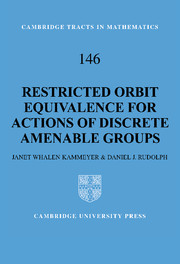4 - Copying Lemmas
Published online by Cambridge University Press: 04 August 2010
Summary
Copying lemmas play a pivotal role in Dye's Theorem, Vershik's Lacunary Isomorphism Theorem and most significantly in Ornstein's Isomorphism Theorem for Bernoulli shifts. The Burton–Rothstein version of this last result puts them in an even more central role as the rest of the argument becomes soft analysis. We are generalizing from this Burton-Rothstein perspective of course, making the core of our equivalence theorem rest on category. Copying lemmas will play a pivotal role for us in two contexts. First in the equivalence theorem they will play the same role as always, allowing one to copy partitions, and in our case full-group elements, from a joining of two systems into one of the two. We will also use a copying lemma as a basic tool in our development of m-entropy to show that sizes are either “entropy-preserving” or “entropy-free”.
These two applications have one fact in common. As indicated above one must copy not only partitions but full-group elements. Hence we will have to investigate how one does this. These copying lemmas will also have one very real difference. For use in the equivalence theorem one will want the copied process to have as much entropy as one can hope for, but for use in the entropy theory, one will want the copy to kill as much entropy as possible. Hence we really must give two copying lemmas.
- Type
- Chapter
- Information
- Publisher: Cambridge University PressPrint publication year: 2002



